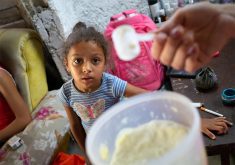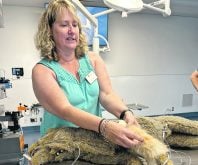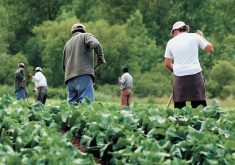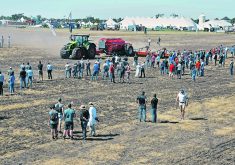Small companies known for their craft vodka, gin, whiskey and beer switch gears to produce hand sanitizer
The urgent need for hand sanitizer is seeing micro-distillers and breweries stepping up.
With retail supplies largely sold out across the country, COVID-19 front-line workers in several industries have been scrambling to help fill the void.
In an effort to meet demand, several makers of alcoholic beverages across the Prairies are using their expertise and manufacturing capabilities to produce batches of alcohol hand-sanitizer.
Using their own resources and money, many are donating it free of charge to the army of front-line health-care workers in many industries and first-responders who rely on it for their protection and the public’s safety.
Read Also

Farming Smarter receives financial boost from Alberta government for potato research
Farming Smarter near Lethbridge got a boost to its research equipment, thanks to the Alberta government’s increase in funding for research associations.
Small companies known for their craft vodka, gin, whiskey and beer have switched gears to produce batches of hand-sanitizer as the spread of COVID-19 coronavirus fuels demand for hygiene products.
Sacha Elez and Adam Dombowsky, co-owners of Smooth 42 Craft Distillery at Brownlee, Sask., said the company re-purposed itself to bottle “emergency vodka,” which is 70 percent rubbing alcohol.
“We started (March 11) before this whole thing was an emergency because we kind of saw it coming and just to stockpile supplies. And then as soon as we heard of shortages, we made the (Facebook) announcement that we are supplying first responders and health-care centres,” said Elez.
Added Dombowski: “It’s exciting and terrifying at the same time what we’re taking on here. It’s evolving at an incredible rate. The demand and need is huge and I just hope we can keep up. We’re running on pretty low sleep.”
The distillery is now following the World Health Organization’s 80 percent alcohol formula for hand sanitizer, which is a blend of ethanal, hydrogen peroxide, demineralized water and glycerin.
“So far it’s all been going out completely free except for the federal institutions that are required to pay. Like the RCMP who have put in some major orders,” he said.
The distillery is pumping out 2,300 litres per day and will soon be able to produce 5,000 litres per day after more floor space is added in their retrofitted curling rink.
“We’ve doubled our staff in the last two weeks and now we hired a construction crew to finish an expansion to be able to house our equipment,” said Elez.
Besides police services, the majority of their hand sanitizer is going to front-line services such as fire departments and medical clinics in the province, including STARS air ambulance.
First Nation communities, as well as federal and provincial correction institutions are also receiving shipments.
Elez said his wife is seven-months pregnant and he’s motivated to ease the burden on hospitals and health-care workers.
“The experts are anticipating that all the hospital beds will be taken due to this pandemic when we’re expecting our baby. So I’m doing everything I can to ensure that our health-care system has what they need so that when she needs them, they’ll be able to help her,” he said.
Lucky Bastard Distillers in Saskatoon is also using its production line to make alcohol hand-sanitizer.
“We’re fortunate we were in a situation where we are one of the bigger micro distilleries. We have a bottle filling machine that makes this rather easy. We have the equipment to accurately measure and safely handle high proof alcohol. So we knew this was something we could do,” said owner Michael Goldney.
But even with the drive to help others, he said there was some initial concern about the rules and regulations surrounding the manufacture and distribution of alcoholic antiseptic.
Before beginning production, Lucky Bastard and several other distillers contacted Health Canada and the Saskatchewan Liquor and Gaming Authority, which govern the sale and production of alcohol.
“It quickly became apparent that the need was more urgent than the process. So we decided we were going to just go ahead and start and hopefully people will be understanding that this is a real emergency situation,” he said.
Within 72 hours of deciding to do it, Goldney, who used to be a family physician, said they had produced their first batch, which was immediately delivered to first responders in the area.
Soon after, Health Canada relaxed rules on the sale of hand sanitizers, disinfectants and protective equipment to limit the spread of the disease.
Like other distillers, Lucky Bastard is following the guidelines of a tested recipe published by the World Health Organization on the emergency manufacture of 80-proof alcohol-based hand sanitizer.
As a medical doctor, he has some advice surrounding the spread of COVID-19.
“I think the most important public health message right now would be to tell people to take this seriously, but stay calm, wash your hands,” he said.
“Regular soap and water is the most effective virus side. It’s more effective than alcohol-based hand sanitizer. So I really want to stress that if you can and you’re near a sink, wash your hands with soap.”
So far, the company has donated 2,500 litres and has 2,000 left to bottle, but will continue to make it as long as there’s a need and can source supplies.
Goldney is grateful that several businesses have donated cash to help subsidize his manufacturing costs, which also includes courier companies volunteering to pick up and deliver truckloads of sanitizer to health-care workers and first responders throughout the province.
“I think this is great opportunity for us as a community to come together and do what needs to be done. So we’re not selling it. We’ve been really fortunate in that spirit of generosity to have people step up,” he said.
Lawrence Warwaruk, one of two brothers who own and operate Farmery Estate Brewery in Neepawa, Man., has some concern about how much longer they will be able to meet the large demand for their hand-sanitizer blend of ethyl alcohol made from their farm-grown hops.
He said the company is running out of essential ingredients.
“I was really shocked, actually, to see the depth of the lack of supply that’s in the marketplace right now. The supply chain just hasn’t caught up to the demand and we’re all getting caught up on this thing,” he said.
“Honestly, the worst-case scenario is that we’re sitting around waiting for supply lines to come meet our demand.”
The repurposed micro-brewery is also trying to find balance between selling and donating it, which as a small business still has a payroll to meet.
“There’s big organizations that want to buy a pallet at a time. We’re trying to figure out how we can accommodate them and still be fair to everybody else. So we’re trying to figure this out really just one step at a time,” he said.
Warwaruk keeps a soldier-like perspective as he tries to maintain the health of his staff and himself throughout long days of work while keeping the production line operating.
“In reality we’re at war here. The first piece of armament we can use is hand-sanitizer and soap and water and social distancing. It’s a new type of idea of how we can have a fight on our hands. But the reality is this is a war and we don’t know how long it’s going to be or to what depth it’s going to go,” he said.
“So it’s all hands on deck, even around here.”


















